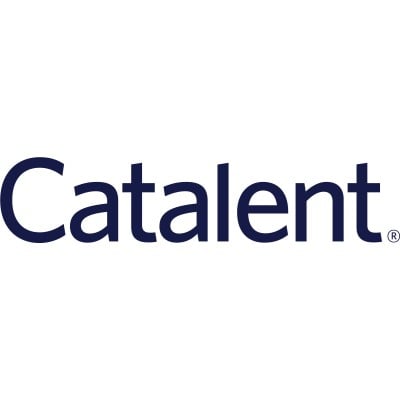
AstraZeneca
We're transforming the future of healthcare by unlocking the power of what science can do for people, society and the planet. For more information, visit www.astrazeneca.com. Community Guidelines: bit.ly/2MgAcio



We're transforming the future of healthcare by unlocking the power of what science can do for people, society and the planet. For more information, visit www.astrazeneca.com. Community Guidelines: bit.ly/2MgAcio

Championing the missions that matter™. Catalent, Inc. is a leading global contract development and manufacturing organization (CDMO) and trusted partner to pharma, biotech, and consumer health companies worldwide. We put patients first in everything we do, helping people live better and healthier lives through every product we help develop, manufacture and deliver. With over 1,000 active development programs at any given time, we launch over 100 new products and line extensions annually. Catalent has supported half of all FDA approvals over the past decade, and our teams working at over 40 global sites help us produce over 60 billion doses every year. Our strength lies in our people: teams across our more than 40 sites and thousands of passionate scientists and technicians who bring expertise in development sciences, delivery technologies, and multi-modality manufacturing. What unites us is our commitment to championing our partners’ missions as our own, anticipating customer needs, solving complex challenges and ultimately making a difference in the lives of patients across the globe. At Catalent, you will be able to directly have an impact, solving problems and ensuring excellence for our customers. Our focus on delivering meaningful outcomes alongside our customers means your work directly impacts millions of people around the world. Join us in championing the missions that matter. Catalent is headquartered in Tampa, Florida, with over 40 global sites. Visit www.catalent.com to learn more.
Security & Compliance Standards Overview












No incidents recorded for AstraZeneca in 2025.
No incidents recorded for Catalent in 2025.
AstraZeneca cyber incidents detection timeline including parent company and subsidiaries
Catalent cyber incidents detection timeline including parent company and subsidiaries
Last 3 Security & Risk Events by Company
Angular is a development platform for building mobile and desktop web applications using TypeScript/JavaScript and other languages. Prior to versions 19.2.16, 20.3.14, and 21.0.1, there is a XSRF token leakage via protocol-relative URLs in angular HTTP clients. The vulnerability is a Credential Leak by App Logic that leads to the unauthorized disclosure of the Cross-Site Request Forgery (XSRF) token to an attacker-controlled domain. Angular's HttpClient has a built-in XSRF protection mechanism that works by checking if a request URL starts with a protocol (http:// or https://) to determine if it is cross-origin. If the URL starts with protocol-relative URL (//), it is incorrectly treated as a same-origin request, and the XSRF token is automatically added to the X-XSRF-TOKEN header. This issue has been patched in versions 19.2.16, 20.3.14, and 21.0.1. A workaround for this issue involves avoiding using protocol-relative URLs (URLs starting with //) in HttpClient requests. All backend communication URLs should be hardcoded as relative paths (starting with a single /) or fully qualified, trusted absolute URLs.
Forge (also called `node-forge`) is a native implementation of Transport Layer Security in JavaScript. An Uncontrolled Recursion vulnerability in node-forge versions 1.3.1 and below enables remote, unauthenticated attackers to craft deep ASN.1 structures that trigger unbounded recursive parsing. This leads to a Denial-of-Service (DoS) via stack exhaustion when parsing untrusted DER inputs. This issue has been patched in version 1.3.2.
Forge (also called `node-forge`) is a native implementation of Transport Layer Security in JavaScript. An Integer Overflow vulnerability in node-forge versions 1.3.1 and below enables remote, unauthenticated attackers to craft ASN.1 structures containing OIDs with oversized arcs. These arcs may be decoded as smaller, trusted OIDs due to 32-bit bitwise truncation, enabling the bypass of downstream OID-based security decisions. This issue has been patched in version 1.3.2.
Suricata is a network IDS, IPS and NSM engine developed by the OISF (Open Information Security Foundation) and the Suricata community. Prior to versions 7.0.13 and 8.0.2, working with large buffers in Lua scripts can lead to a stack overflow. Users of Lua rules and output scripts may be affected when working with large buffers. This includes a rule passing a large buffer to a Lua script. This issue has been patched in versions 7.0.13 and 8.0.2. A workaround for this issue involves disabling Lua rules and output scripts, or making sure limits, such as stream.depth.reassembly and HTTP response body limits (response-body-limit), are set to less than half the stack size.
Suricata is a network IDS, IPS and NSM engine developed by the OISF (Open Information Security Foundation) and the Suricata community. In versions from 8.0.0 to before 8.0.2, a NULL dereference can occur when the entropy keyword is used in conjunction with base64_data. This issue has been patched in version 8.0.2. A workaround involves disabling rules that use entropy in conjunction with base64_data.